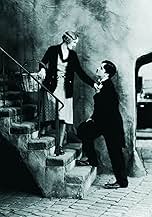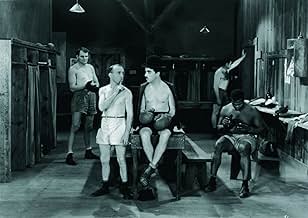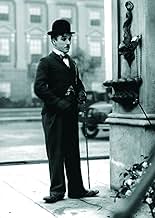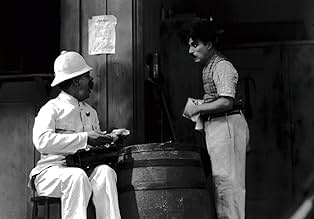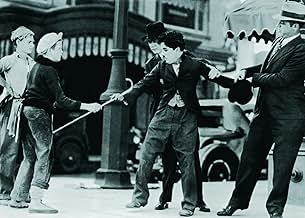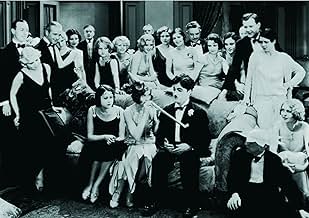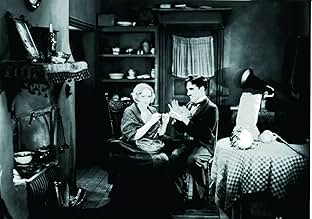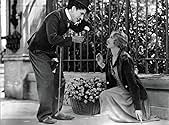Mithilfe eines reichen, aber launischen Gewohnheitstrinkers häuft ein vertrauensseliger Vagabund, der sich in ein blindes Blumenmädchen verliebt hat, möglichst viel Geld an, um ihr medizinis... Alles lesenMithilfe eines reichen, aber launischen Gewohnheitstrinkers häuft ein vertrauensseliger Vagabund, der sich in ein blindes Blumenmädchen verliebt hat, möglichst viel Geld an, um ihr medizinische Hilfe zukommen zu lassen.Mithilfe eines reichen, aber launischen Gewohnheitstrinkers häuft ein vertrauensseliger Vagabund, der sich in ein blindes Blumenmädchen verliebt hat, möglichst viel Geld an, um ihr medizinische Hilfe zukommen zu lassen.
- Regie
- Drehbuch
- Hauptbesetzung
- Auszeichnungen
- 6 wins total
Charles Chaplin
- A Tramp
- (as Charlie Chaplin)
Al Ernest Garcia
- The Millionaire's Butler
- (as Allan Garcia)
Johnny Aber
- Newsboy
- (Nicht genannt)
Jack Alexander
- Boxing Match Spectator
- (Nicht genannt)
T.S. Alexander
- Doctor
- (Nicht genannt)
Victor Alexander
- Superstitious Boxer
- (Nicht genannt)
Albert Austin
- Street Sweeper
- (Nicht genannt)
- …
Harry Ayers
- Cop
- (Nicht genannt)
Eddie Baker
- Boxing Fight Referee
- (Nicht genannt)
Henry Bergman
- Mayor
- (Nicht genannt)
- …
Edward Biby
- Nightclub Patron
- (Nicht genannt)
Betty Blair
- Woman at Center of Table in Restaurant
- (Nicht genannt)
Buster Brodie
- Bald Party Guest
- (Nicht genannt)
Jeanne Carpenter
- Diner in Restaurant
- (Nicht genannt)
Zusammenfassung
Reviewers say 'City Lights' is celebrated for its blend of comedy and pathos, showcasing Charlie Chaplin's iconic Tramp character in a poignant love story with a blind flower girl. The film is praised for its masterful physical comedy, expressive acting, and memorable scenes, particularly the boxing match and the emotional finale. Chaplin's direction, composition of the score, and the film's historical significance are frequently highlighted. However, some reviewers note that the silent format and slow pacing may challenge modern audiences. The themes of love, selflessness, and social commentary resonate deeply, making 'City Lights' a timeless classic.
Empfohlene Bewertungen
City Lights (1931)
**** (out of 4)
Charlie Chaplin returns as The Tramp and this time he falls in love with a blind girl (Virginia Cherrill) and sets out to help her. The Tramp eventually meets a suicidal drunk (Harry Myers) and their friendship leads to what might eventually help the girl he loves.
Chaplin made great films before and after CITY LIGHTS but for my money this here is his greatest film as well as one of the greatest films ever made. Not only is it one of the funniest movies ever made but I'd also argue that it's one of the greatest love stories, if not the greatest. It really says a lot when a movie can conqueror two genres at one time but CITY LIGHTS is simply one of the greatest movies ever made.
I think it says a lot that you get one classic scene after another and there's really not a weak spot to be found here. Being 1931 it took some real guts for Chaplin to deliver a silent film and I think he knew that he had to deliver something special because people had moved onto sound. He certainly delivered something special as this here was easily the funniest film he had made up to this point. The opening sequence with the introduction of The Tramp was priceless and we got one hilarious scene after another from that point.
The scenes with the drunk are downright hilarious as is another scene where The Tramp is trying to eat but without much success. The cigar sequence is a masterpiece as is the by the water. In fact, the story between The Tramp and the drunk would have made a terrific movie on its own. Just like the stuff with The Tramp and the blind girl would have made a perfect film. What's so special is that you get both stories wrapped up in one and it really delivers.
Chaplin played The Tramp countless times but he was never better than he is here. Just check out the timing in countless scenes including the boxing match and you can't help but be impressed with the actor. Myers also deserves a lot of credit as the drunk as his timing has to match that of Chaplin throughout and the two men do a wonderful job together. Then you've got Cherrill who wasn't a professional actor but the director makes her shine throughout.
CITY LIGHTS contains one great scene after another and all of the laughs lead up to one of the most powerful endings in film history. There's really not enough great things that can be said about this film as it continues to get better with each passing year.
**** (out of 4)
Charlie Chaplin returns as The Tramp and this time he falls in love with a blind girl (Virginia Cherrill) and sets out to help her. The Tramp eventually meets a suicidal drunk (Harry Myers) and their friendship leads to what might eventually help the girl he loves.
Chaplin made great films before and after CITY LIGHTS but for my money this here is his greatest film as well as one of the greatest films ever made. Not only is it one of the funniest movies ever made but I'd also argue that it's one of the greatest love stories, if not the greatest. It really says a lot when a movie can conqueror two genres at one time but CITY LIGHTS is simply one of the greatest movies ever made.
I think it says a lot that you get one classic scene after another and there's really not a weak spot to be found here. Being 1931 it took some real guts for Chaplin to deliver a silent film and I think he knew that he had to deliver something special because people had moved onto sound. He certainly delivered something special as this here was easily the funniest film he had made up to this point. The opening sequence with the introduction of The Tramp was priceless and we got one hilarious scene after another from that point.
The scenes with the drunk are downright hilarious as is another scene where The Tramp is trying to eat but without much success. The cigar sequence is a masterpiece as is the by the water. In fact, the story between The Tramp and the drunk would have made a terrific movie on its own. Just like the stuff with The Tramp and the blind girl would have made a perfect film. What's so special is that you get both stories wrapped up in one and it really delivers.
Chaplin played The Tramp countless times but he was never better than he is here. Just check out the timing in countless scenes including the boxing match and you can't help but be impressed with the actor. Myers also deserves a lot of credit as the drunk as his timing has to match that of Chaplin throughout and the two men do a wonderful job together. Then you've got Cherrill who wasn't a professional actor but the director makes her shine throughout.
CITY LIGHTS contains one great scene after another and all of the laughs lead up to one of the most powerful endings in film history. There's really not enough great things that can be said about this film as it continues to get better with each passing year.
This is my favorite Chaplin film, but I don't want that to diminish his other work, either. MODERN TIMES was an outstanding work of social satire, THE GOLD RUSH was great slapstick, and even the largely-neglected MONSIEUR VERDOUX strikes a certain unforgettable tone. Chaplin didn't make a bad movie, and I'm not even sure that CL is his best, exactly. But it IS my favorite, if only for the ending.
That ending has been the subject of much comment here. I think it's a masterpiece in a single scene. Chaplin's little tramp has never seemed less like a character and more like a living, breathing human being. It's a monument to understated sentimentality.
To me, the rest of the film exists largely to set the context for that one magnificent piece of celluloid. Yes, the boxing scene is great, and the scene where he rescues the millionaire is also wonderful, but it's that ending that makes us all love this movie.
That ending has been the subject of much comment here. I think it's a masterpiece in a single scene. Chaplin's little tramp has never seemed less like a character and more like a living, breathing human being. It's a monument to understated sentimentality.
To me, the rest of the film exists largely to set the context for that one magnificent piece of celluloid. Yes, the boxing scene is great, and the scene where he rescues the millionaire is also wonderful, but it's that ending that makes us all love this movie.
As always the little tramp is fleeing the long arm of the law when he is mistaken for a wealthy man by a blind girl selling flowers by the roadside. While he longs to help her the tramp knows he cannot. However when he is at his lowest he stumbles upon a drunken man who he helps out who may be able to help him in turn if the two of them can sober up long enough.
In response to seeing some modern trash posing as "comedies" recently (Little Man, Norbit, Pluto Nash I'm looking at you) I decided to check out some comedies that have stood the test of time a few Chaplin films being among them. City Lights is one of those film that you will think you have seen even when you have not. I knew I had never actually seen it but the wonderful opening scene on the statue and the scenario of the blind girl by the side of the road were very familiar to me and I was right into it from the start. As was often the case, this film has a thin narrative but one that allows for several scenarios for Chaplin to work his magic. And so he does with some classic sequences across the whole film.
The statue scene is memorable for how he makes so much out of so little but the brilliant choreography of the boxing match had me rolling with laughter as it moved so beautifully and imaginatively around the ring. Chaplin is a master and this is just one of many films that shows it as he creates a great little clown that we care about but can also laugh at. His support do no more than that support him but yet they are also roundly good. Cherrill provides attractive heart despite her simple character, while Myers, Garcia, Mann and a few others do good physical work alongside Chaplin.
City Lights is a really great film that is all the more impressive for still feeling fresh and funny more than seventy years after it was made. The simple narrative is the frame but it is the wonderful and frequent set-pieces that tickle and also stick in the mind. So tonight you might be looking at your film queue with lots of modern comedies but it is worth bumping this classic to the top of the list instead.
In response to seeing some modern trash posing as "comedies" recently (Little Man, Norbit, Pluto Nash I'm looking at you) I decided to check out some comedies that have stood the test of time a few Chaplin films being among them. City Lights is one of those film that you will think you have seen even when you have not. I knew I had never actually seen it but the wonderful opening scene on the statue and the scenario of the blind girl by the side of the road were very familiar to me and I was right into it from the start. As was often the case, this film has a thin narrative but one that allows for several scenarios for Chaplin to work his magic. And so he does with some classic sequences across the whole film.
The statue scene is memorable for how he makes so much out of so little but the brilliant choreography of the boxing match had me rolling with laughter as it moved so beautifully and imaginatively around the ring. Chaplin is a master and this is just one of many films that shows it as he creates a great little clown that we care about but can also laugh at. His support do no more than that support him but yet they are also roundly good. Cherrill provides attractive heart despite her simple character, while Myers, Garcia, Mann and a few others do good physical work alongside Chaplin.
City Lights is a really great film that is all the more impressive for still feeling fresh and funny more than seventy years after it was made. The simple narrative is the frame but it is the wonderful and frequent set-pieces that tickle and also stick in the mind. So tonight you might be looking at your film queue with lots of modern comedies but it is worth bumping this classic to the top of the list instead.
City Lights is simply put one of the best movies out there. Every scene is classic and had a huge impact on the history of film-making. Chaplin's last 'silent' film tells the story of a poor little man the tramp played by Chaplin who falls in love with a blind flower girl. He becomes friends with a wealthy man who constantly tries to commit suicide. The man only recognizes the tramp character when he is drunk. To impress the flower girl the tramp uses the man's wealth to make her fall in love with him. The only problem is that when the man is sober he doesn't recognize the tramp anymore. On top of this the flower girl has to pay 22 dollars of rent or she will be thrown out of her apartment. Now the tramp desperately seeks for jobs in the city to help his love. Out of this simple plot great comedy and heart breaking moments come forth.
The outcome of the movie is to almost all people known. It is regarded as one of the best endings ever taped on film. The movie itself still is masterpiece more than 70 years after it's release. I personally rate this as Chaplin's second best I have seen so far. My favorite remains The Gold Rush. Still this movie gets 5/5 stars from me.
The outcome of the movie is to almost all people known. It is regarded as one of the best endings ever taped on film. The movie itself still is masterpiece more than 70 years after it's release. I personally rate this as Chaplin's second best I have seen so far. My favorite remains The Gold Rush. Still this movie gets 5/5 stars from me.
I always thought this was one of Charlie Chaplin's nicest, most under-appreciated silent movie gems. Then I discovered it really wasn't underrated; it's rated very high on most critics' lists. It may be that I usually hear about some of his other movies than I do this one.
Part of the reason I think so highly of this is simply that I'm a sentimentalist and story in this film is a very touching one. It's a romance between Charlie's tramp character (no name) and a blind girl, who also had no name in this film. Virginia Cherill, who played the blind woman and had a wholesome, pretty face which I found very attractive.
I'm not always a huge fan of pantomime except for some great comedians of the era like Chaplin, Harold Lloyd and Buster Keaton, but Chaplin was so good at it and this is one of the last of dying breed as "talkies" were out in full force by 1931. Chaplin was at his best in silent movies, anyway, and his comedy routines are legendary. He gave me a lot of laughs in this film, as always, and I particularly laughed (I love slapstick) at the boxing scene. Kudos, too, to Harry Myers as the "eccentric millionaire."
There's a lot of drama as well as humor in this 86-minute gem as the Tramp tries to aid a blind girl, raising money so she can get an operation to restore her sight.
Comedy, romance, drama (with suffering) all combine to make this an extraordinary piece of entertainment. It's hard to believe this movie was not up for one, single Academy Award.
Part of the reason I think so highly of this is simply that I'm a sentimentalist and story in this film is a very touching one. It's a romance between Charlie's tramp character (no name) and a blind girl, who also had no name in this film. Virginia Cherill, who played the blind woman and had a wholesome, pretty face which I found very attractive.
I'm not always a huge fan of pantomime except for some great comedians of the era like Chaplin, Harold Lloyd and Buster Keaton, but Chaplin was so good at it and this is one of the last of dying breed as "talkies" were out in full force by 1931. Chaplin was at his best in silent movies, anyway, and his comedy routines are legendary. He gave me a lot of laughs in this film, as always, and I particularly laughed (I love slapstick) at the boxing scene. Kudos, too, to Harry Myers as the "eccentric millionaire."
There's a lot of drama as well as humor in this 86-minute gem as the Tramp tries to aid a blind girl, raising money so she can get an operation to restore her sight.
Comedy, romance, drama (with suffering) all combine to make this an extraordinary piece of entertainment. It's hard to believe this movie was not up for one, single Academy Award.
Wusstest du schon
- WissenswertesChaplin re-shot the scene in which the Little Tramp buys a flower from the blind flower-girl 342 times, as he could not find a satisfactory way of showing that she thought the mute tramp was wealthy.
- Patzer(at around 50 mins) When the man swallows part of the Tramp's soap and starts spraying bubbles, the tube used to spray the bubbles is clearly visible behind him.
- Zitate
The Tramp: You can see now?
A Blind Girl: Yes, I can see now.
- Alternative VersionenAbout seven minutes of footage of Georgia Hale playing the flower girl exists and is included in the 2003 DVD release. The footage was shot during a brief period when the actress originally cast to play the character had been fired and replaced with Hale, but Charles Chaplin was forced to resume filming with the original actress due to the amount of film already shot.
- VerbindungenEdited into Geschichte(n) des Kinos: Fatale beauté (1994)
Top-Auswahl
Melde dich zum Bewerten an und greife auf die Watchlist für personalisierte Empfehlungen zu.
Details
- Erscheinungsdatum
- Herkunftsland
- Offizieller Standort
- Sprachen
- Auch bekannt als
- Lichter der Großstadt - Eine Komödien-Romance als Pantomime
- Drehorte
- Produktionsfirma
- Weitere beteiligte Unternehmen bei IMDbPro anzeigen
Box Office
- Budget
- 1.500.000 $ (geschätzt)
- Bruttoertrag in den USA und Kanada
- 19.181 $
- Eröffnungswochenende in den USA und in Kanada
- 9.102 $
- 8. Juli 2007
- Weltweiter Bruttoertrag
- 55.154 $
- Laufzeit
- 1 Std. 27 Min.(87 min)
- Farbe
- Sound-Mix
Zu dieser Seite beitragen
Bearbeitung vorschlagen oder fehlenden Inhalt hinzufügen

